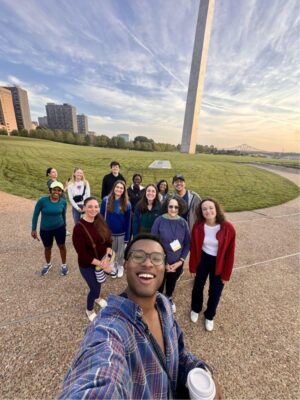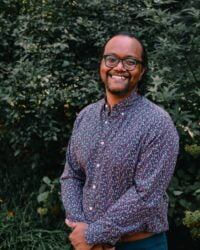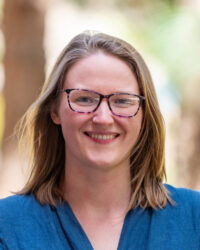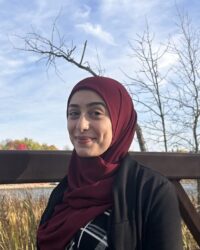The IAPHS Student Committee is focused on bringing together the next generation of population health scientists as friends, colleagues, and future collaborators. Recognizing the wide array of students in population health, this committee seeks to bridge gaps in the field by bringing these students, often from varied departments across the nation, together for professional and academic development as well as networking.
The student committee organizes and hosts events year-round. During the annual meeting, held every fall, we host a professional development activity/event, promote student talks and posters, and organize an informal social activity. These events provide an opportunity for students to connect with academically like-minded peers while developing skills to prepare us for our next career steps.
Throughout the rest of the year, the student committee focuses on other training opportunities including webinars, workshops, and panels. Some recent highlights been:
- Academic Careers: Exploring Institutional Differences and Charting Your Path with Advice from Leading Scholars
- Abstract Writing Workshop for Students
The student committee consists of chairs and co-chairs covering: the student committee as a whole, webinar activities, conference activities, secretary and social media, and diversity and membership outreach. In addition to these core members, the student committee consists of a number of general members interested in building IAPHS. Brief biographies of the current chairs/co-chairs can be found below. We’re always looking for new members and chairs, and if you’re interested in joining us please contact Brianne Cook at bcook@iaphs.org. If you’re not a member of IAPHS, but a student who is passionate about population health, we encourage you to join to stay in the loop on upcoming events!




Arinala Randrianasolo, Chair
Nala is a fifth-year PhD candidate in the Sociology and Demography programs at Pennsylvania State University. His research interests include racialized health disparities, race and ethnicity, the life course, and the health of the multiracial population in the United States. His dissertation dives into new strategies for contextualizing and understanding the health of the multiracial population over the life course. In addition to his dissertation, he is also working on projects that dig into whether established health disparities theories apply to the multiracial population. Prior to going to graduate school, Nala was an attorney in Chicago working to help non-profits secure financial resources to strengthen their programs and the communities they were embedded in.

Tai Simpson (they/them), Secretary & Social Media

Kerri Ivey, Webinar

Torrey Robinson, Webinar
Torrey Robinson is a second-year PhD student in Population Health Science at the University of Mississippi Medical Center and a Mississippi native. Her research focuses on maternal, child, and family health, exploring how social determinants, health system navigation, and health information engagement affect access to care and health outcomes. A pediatric speech-language pathologist by training, she values community engagement and understands the power of social relationships and connection, aiming to leverage these in her research to advance health equity through more integrated, family-centered systems of care.

Ekaterina Baldina, Conference
Ekaterina Baldina is pursuing a PhD in Sociology at Indiana University Bloomington. Her interests span social demography, intergenerational mobility, population health, and social networks. She is interested in how inequalities shape the health of different population groups and how social inequality accumulates across generations. She mainly uses quantitative methods in her work but also has experience and training in qualitative research. Katya is also pursuing a Master’s degree in Applied Statistics and is interested in teaching quantitative methods to undergraduate and graduate students.

Whitney Wells, Conference
Whitney Wells, MSc is a PhD candidate in Epidemiology and Translational Science at the University of California, San Francisco. Whitney’s research examines the health impacts of family support policies and early childhood education access, and the potential for these policies to address existing health inequities. She uses quasi-experimental methods and natural experiments to generate evidence to inform evidence-based policymaking. For her dissertation she is examining whether sociodemographic factors modify the association between parenthood and cardiovascular risk factors, as well as the role of family support policies (paid family leave and universal pre-kindergarten access) in facilitating parents’ health maintenance and influencing health disparities among US parents.

Olumayowa Idowu, Diversity & Membership
Mayowa is pursuing a PhD in Policy Studies with a concentration in health policy, at Clemson University. He is interested in the intersections of local zoning, and the social determinants of health. His current projects include equity in public health, inclusionary zoning, affordable housing and health outcomes, and collaborative economic development and transportation infrastructure plans and equity considerations for local communities in these plans. He plans to have his dissertation focus on the intersections of inclusionary zoning, affordable housing and health status at individual, family, and population levels.

Tomiwa Ayetigbo, Diversity & Membership
Tomiwa Ayetigbo is currently pursuing a Master of Science in Public Health (MSPH) degree in Applied Epidemiology at the School of Public Health, University of Alabama at Birmingham. His research broadly examines the social determinants of health. Using a gene–environment framework, he explores how social and biological factors interact to shape health, particularly in obesity and cardiovascular outcomes. His work takes a multidisciplinary approach, integrating perspectives from sociology, biostatistics, medicine, and epidemiology.

Susan Osayande, General Member
Susan Osayande is a Ph.D. student in Human Development and Family Science at Auburn University. She earned her Master of Development Practice, where she focused on global development, policy analysis, and applied research. Her work examines socioeconomic disparities, social mobility, and the social determinants of health, with particular interest in how social policy and structural conditions shape health and wellbeing both within countries and across international contexts. She also analyzes patterns in basic needs access and wellbeing, leveraging large-scale longitudinal datasets to identify trends at national and global levels.

Roa Sabra, General Member

Rejoice Obiora, General Member
Rejoice Obiora, MPH, is a PhD student in Population Health at Lehigh University’s College of Health. Her research focuses on contraceptive access and use among African immigrant communities in the United States, with particular attention to how structural, social, and cultural factors shape reproductive health outcomes. She is also a member of the SRH Power Lab, where she contributes to ongoing mixed-methods research on contraceptive misinformation among college-aged students in the U.S. Read more

Michael Green, Past Chair
Michael D. Green (he/him) is a doctoral candidate at the Department of Population Health Sciences at the Duke University School of Medicine. Michael’s broad research interests are in social determinants of health, cardiology, and racial disparities. He currently has a National Institute of Aging Diversity Supplement award on one of his mentor’s (Dr. Matthew E. Dupre) R01 grants, which examines the impact of social determinants of health on risk trajectories for cardiovascular disease, and is assembling a fellowship application with an intended submission in Fall 2023. Michael plans to pursue dissertation research that investigates discrimination in a healthcare setting’s impact on cardiovascular disease risk and outcomes. He plans to establish a research agenda that surrounds unequal treatment in preventative practices for heart disease. He hopes to work at the intersection of academic research, media, and industry, focusing on health communication and interactions within the healthcare system. Read more
